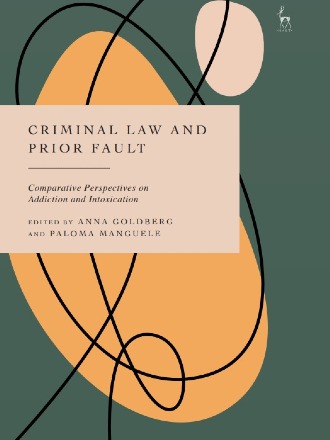‘Prior fault’ in court: too simple a solution for complex cases?

Suppose someone commits an offencewhile psychotic. Are they responsible for their actions? In criminal law, rules exist whereby the offender may receive a reduced punishment or be absolved of criminal responsibility altogether. After all, you are not at fault for being psychotic.
Yet, if such psychoses arise from voluntary drug use, the issue becomes more complicated. Couldn't we consider the development of a psychosis in such cases to be your own fault, and shouldn't you be held responsible for the offence? And what if you have been addicted for years, or even since childhood, which led to your substance use prior to the psychotic breakdown. Is it still your own choice and fault to become psychotic?
Welcome to the world of ‘prior fault’, the legal terms for the ‘your own fault, tough luck’ principle. On 13 November, the book Criminal Law and Prior Fault, Comparative Perspectives on Addiction and Intoxication will be published on this subject, specifically in relation to addiction and substance use.

Multidimensional book
The book was edited and partly written by Anna Goldberg, assistant professor of criminal law at the University of Groningen, and her colleague Paloma Manguele from the University of Sussex. It is a multidimensional book: lawyers, psychologists, philosophers and neuroscientists all contributed to it.
Goldberg: ‘In many criminal cases, the application and scope of prior fault is clear, but when you look at the grey areas, you need more than just legal rules to determine where responsibility lies. This book brings all these disciplines together. Most chapters are written by two authors, each with a different background. What this book shows is that the law cannot solve this issue on its own.'
Critical of current practice
In current Dutch legal practice, great importance is attached to personal responsibility. Goldberg: 'The principle of ‘your own fault, tough luck’ carries a lot of weight: you should or could have known, you should have thought for yourself. You can hold people accountable for being intoxicated, but in some cases it is not reasonable. Can you ask the same of someone who is addicted, with complex additional psychological problems, as you would of me or you? Sometimes perhaps, but the idea that everyone has the same degree of control over their behaviour does not do justice to reality.'
This makes the book interesting not only for academics, but for anyone involved in this type of case in legal practice. Goldberg: 'We are critical of how these cases of addiction and intoxication are currently handled. Sometimes, insufficient attention is paid to all the circumstances and reasons that lead to substance use and criminal behaviour. That interaction is not as straightforward as is sometimes presented, and behavioural experts can play a greater role in this. It does not matter what judgement the judge ultimately reaches, as long as attention is paid to this interaction.'
Criminal Law and Prior Fault can be ordered here with the discount code GLR BD8: https://www.bloomsbury.com/9781509981281
More news
-
08 December 2025
Colourful Characters: Bert Röling
